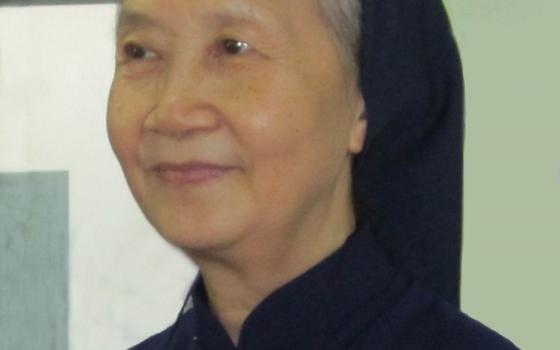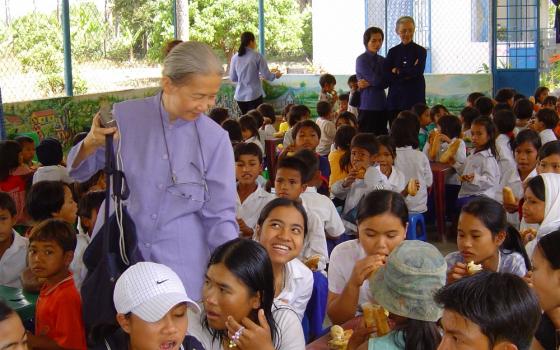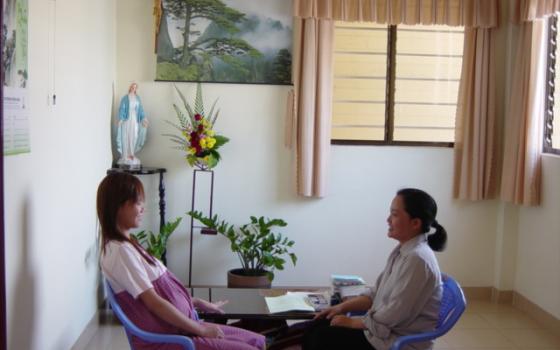The Daughters of Charity of St. Vincent de Paul, internationally known for their work defending the rights of the poor, especially women and children in rural areas, started their services in Vietnam in 1928 and now have more than 600 nuns in service.
In the last 30 years, the Daughters of Charity have focused on educating children, operating shelters for victims of sexual abuse and domestic violence and offering vocational training for women who could not pursue higher education. They have established a bureau where lay professionals in the fields of social work, special education, health care, counseling, law, architecture, environment and finance offer to work with the sisters in more than 50 centers located mostly in remote and mountain regions.
Sr. Pascale Le Thi Triu, representative of the bureau, talked with GSR about its programs.
GSR: Tell us how your society improves the lives of poor women.
Sr. Pascale Le Thi Triu: Legally and administratively, Vietnam society calls for equal rights and opportunity for men and women. Yet, culturally, Vietnamese people still discriminate against women because they still allow a patriarchal philosophy to influence their attitude and behaviors. Men enjoy greater education and training opportunities while women are subjected to unskilled labor and domestic services with no compensation and limited opportunities for growth and development. In big cities, however, women acquire a higher chance for education and training.
We believe in a higher aim than just improving the material life of poor women. We are seeking to provide education, through scholarships and grants, to build their dignity and self-confidence. Consequently, we hope to see women realize their equal capacity to love, to make decisions, to change their environment and finally to accept what they cannot change.
Next, we bring out an awareness of the human dignity in all, regardless of their sex, ethnic or social strata differences. Many women lose their dignity when they live in poverty, perform badly in school or lose their virginity. They are made to understand that success [happiness] in life depends on personal vision.
After they acquire basic knowledge and skills in social interactions, productivity and human values, we help them set priorities in life and provide employment counseling. Women from rural settings, ethnic minorities and disabled persons can get training and find work in sewing, embroidery, culinary arts, elder and child care, domestic services, bookkeeping and environmental protection.
What about single mothers, victims of domestic violence and the like?
First, we seek to strengthen the women's self-confidence, their belief in their dignity, their capacity to stand on their own feet, their operation and production, and most particularly, their self-discipline and emotional independence. In Vietnamese society, women are trained to trust in family, in the support of men to be able to survive life challenges. They fear abandonment and betrayal from their men, but tend to depend on them and to endure domestic violence in order to save their family.
We create programs in our Welcome House to give accommodation and advice to women suffering from domestic violence and abuse. We help them recognize common causes of persistent domestic violence. They should love and respect themselves and not allow or provoke their husbands into abusing them. If husbands know that their wives can live independently, they stop abusing them. In the process of counseling, we invite the husbands to join our family therapy sessions, where both parties are enabled to see how domestic violence occurs and how they should end it in order to build family harmony.
We establish legal protection for women against domestic violence and societal discrimination through the help of a women's union organization legally recognized by the government as a resource for family counseling and legal proceedings.
We also help prepare young women for marriage, advising them on how they should involve their family members in sharing domestic chores and decision making. Women often take on these chores as their monopoly, leaving all family decisions in the hands of the man. By doing so, they reinforce the patriarchal attitude in the Vietnamese culture.
What do you do to strive for sexual equality?
When women acquire equal opportunity in education, in professional training and exposure about human dignity and human relations, they become conscious of their equality in the laws and in the potential they have as women who are endowed with special gifts. They also realize that as children of God we are all loved and given what is needed for our growth in God's design for each one of us.
Our programs are designed to teach women that, like men, they have equal opportunity. They must believe that their happiness is not from other women and men and they cannot be dependent on people's protection and help all their lives. Women can give life, work in pursuit of happiness for themselves and others, and be proud of their own achievements.
Human rights are not publicly discussed and scrutinized in Vietnam, although, according to national tradition, people all believe in God. They need to know that God loves and treats them like his children, so they are brothers and sisters with the same dignity, rights and chances.
[Joachim Pham is a correspondent for National Catholic Reporter, based in Vietnam.]


